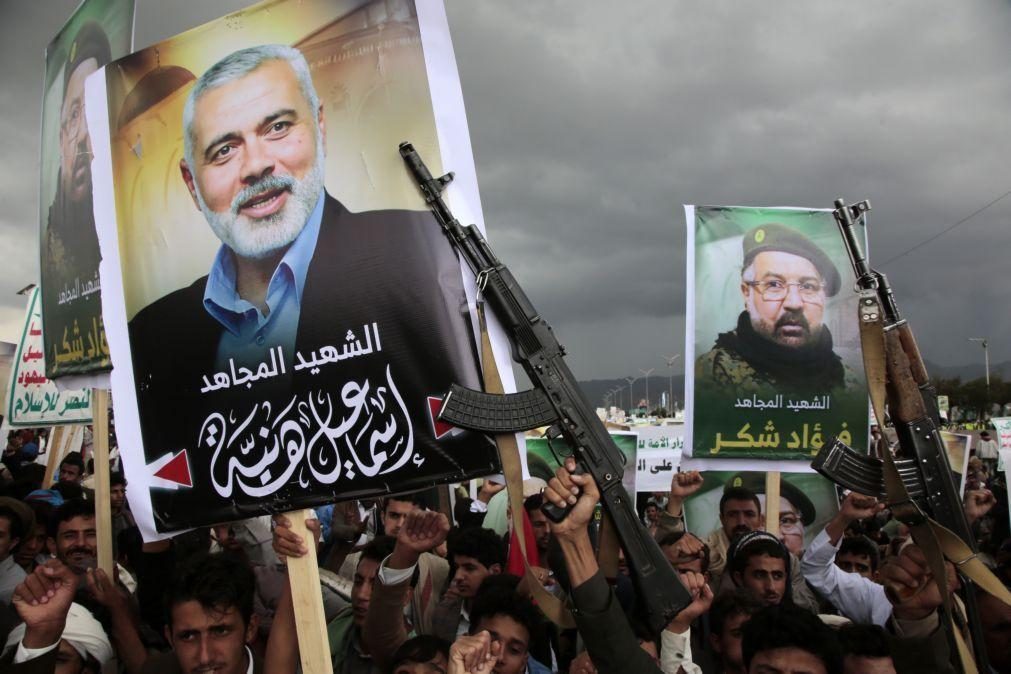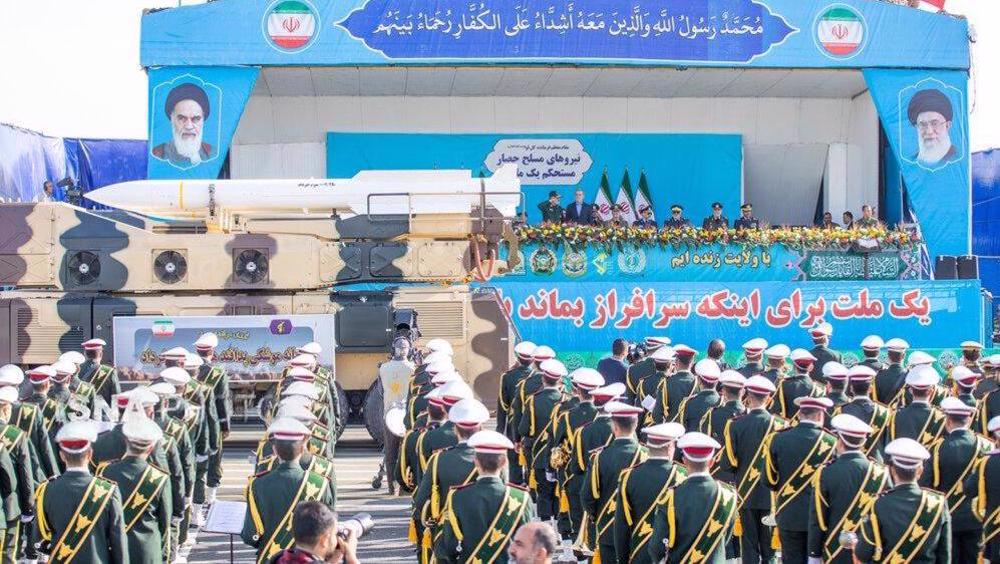IN THE MEDIA
What could be the retaliation after a Hamas official was killed on Iran soil?: AIJAC guest Behnam ben Taleblu on ABC Radio
August 23, 2024

23 August 2024
In the weeks following the assassination of a Hamas official on Iran soil, the world has been bracing to see how and when Iran will hit back at Israel, believed to be behind the killing. In recent days Iran has changed its messaging about a future attack, but experts fear the ramifications from Iran’s retribution.
Guest: Benham Ben Taleblu, Senior Iran Analyst at the Foundation for Defence of Democracies
Producer: Matt Simpson
LISTEN: https://www.abc.net.au/listen/programs/radionational-breakfast/how-will-iran-retaliate/104258092
TRANSCRIPT
[Patricia Karvelas]
It’s been three weeks since the assassination of the prominent Hamas leader, Ismail Haniyeh, in Tehran, prompting the Iranian government to pledge retribution. Since then, the world has been on tenterhooks to see how this will escalate, and if Israel will be drawn into another Middle East war. In the last few days, the messaging from Iran has shifted. It’s now signalling the right to attack, but at a later date. Behnam ben Taleblu is a senior Iran analyst at the Foundation for Defence of Democracies. He’s currently in Australia and is my guest on Radio National Breakfast. Welcome to the program.
[Behnam ben Taleblu]
Great to be with you, Patricia. Thanks so much for having me.
[Patricia Karvelas]
The assassination felt like the moment the Middle East would erupt into a bigger struggle of some sort, but it hasn’t. What are we waiting for and why so long?
[Behnam ben Taleblu]
Well, unfortunately, there is a non-zero chance that Tehran could and will respond. If we remember back in April, the Islamic Republic made history after 45 years of a shadow war, or a proxy war, or a covert war, you would call it, against Israel. They moved from the shadows into the public, firing over 300 projectiles.
We should take them at their word that they do intend to respond. But right now, I think they have much of the world community where they want, and that is dangerous. That is having to watch the news on a day-to-day basis.
This is, after all, what a terrorist regime would do, to benefit from the infliction of terror and this constant sense of fear and anxiety over, will missiles fly again in the Middle East?
[Patricia Karvelas]
Iran has continued to make threats against Israel. You’ve said the Iranian military and government are using the threats as a form of psychological warfare. Of course, for many Israelis, it is that.
They don’t know when this is coming. They’re waiting. Is it working?
[Behnam ben Taleblu]
Based on what we see coming out of Israel, based on people we talk to there, based on social media, this go around not so much. In April, it did indeed appear to be working. There was a 12-day period between when the Iranians had their alleged consulate attack in Syria and when the military responded.
Now we’re about 22 days and no military response, plus the successful interception last go around has led to a bit more of a normal resumption of the pattern of life. But who this is working on is not Israeli society. This is working on the American public diplomacy machine.
The threat of a wider regional war in the Middle East, this late in the game, so close to the election, is actually spurring the Americans to put the handcuffs on the Israelis rather than on the Iranians who are escalating this situation. That’s an eerie position for the West to be in, where its adversaries are driving it to restrain its allies.
[Patricia Karvelas]
Is it likely that if a ceasefire was agreed on, that Iran would back down from retribution attacks? I know that’s being constantly raised as an idea.
[Behnam ben Taleblu]
I think certainly the regime would take the victory lap. Indeed, if the Iranians were able to get the Israelis to fall short of their war aims, controlling the Philadelphi corridor, dismantling and destroying Hamas, should that terrorist group in Gaza survive, then the Iranians could say we threatened ballistic missile use and were able to become the champions or the defenders of Gaza. And from that sense would grow emboldenment, and from emboldenment would grow unfortunately another boom and bust cycle of violence.
So while it may look like peace in the short term, I fear it’ll sow the seeds of a much wider Middle Eastern conflict in the long term.
[Patricia Karvelas]
If you’re just tuning in, Behnam ben Taleblu is our guest, a senior Iran analyst, and my guest here on RM Breakfast from the Foundation for Defense of Democracies. In recent weeks, Donald Trump’s presidential campaign has claimed it was the victim of a cyber attack by Iran. Is cyber warfare something that Iran is using here?
[Behnam ben Taleblu]
Oh my goodness, and you need not take it from me. The Director of National Intelligence, which oversees more than a dozen American intelligence organizations and affiliates, has said two things recently. One, that the Islamic Republic is interested in something kinetic, meaning to militarily or send an assassin to kill the former president, as well as the continued hacking via cyber means, as you simply alluded to, of his campaign.
That two-pronged approach, in my view, is born out of, again, that sense of emboldenment that this regime is not deterred. And given that last go-round, the Trump administration issued unilateral American sanctions that had, in terms of their economic effect, much more damage than about a decade of multilateral sanctions. They are looking to prevent this, and they’re looking to prevent it eerily at all costs, including cyber attacks and even including support for assassinations.
[Patricia Karvelas]
There have been reports of Iran recruiting Israelis to act as foreign agents for them. What do you make of these?
[Behnam ben Taleblu]
Yeah, just twice this summer alone, so twice in the past few months via Telegram, the Iranians have been trying to, this is not a radicalization effort per se, this is more of an attempt to feign or spoof a whole series of accounts. Some of them were job boards accounts to get them to do odd jobs, to put up posters, to move things from one location to another, to scout locations, again, based on what has been publicly reported, and then to pay these folks via Bitcoin. So this is the Islamic Republic constantly looking in a whole series of Western democracies, where is the soft underbelly?
Where can we find a vector of influence? And at least in places where the Islamic Republic does not have embassies, unlike Australia, some places like the US where I live and work, as well as in Israel, they are looking to move into transnational criminal syndicates because their proxies, Hezbollah, Hamas, what have you, which is traditionally a way for them to hide their hand, is these days a calling card.
[Patricia Karvelas]
How close is Iran to becoming a nuclear-armed state?
[Behnam ben Taleblu]
You know, despite all the dissonance and the disagreements between Australia, America, Israel, the EU, UK, over what’s the correct approach towards Iran, this is the one issue that unites them all. All of these Western democracies are looking to prevent the Islamic Republic from joining the nuclear club, and I think rightly so. Today, based on the knowledge-based gains they’ve made, they could, within really a matter of days, develop enough weapons-grade uranium, that’s the uranium needed at the sufficient level of purity, for one nuclear weapon.
This is even less than a week, some experts put it at that. To further weaponise it, some experts say they need as little as six months, given other knowledge-based gains they’ve had before. The real question is, would the West be able to detect this deviation in this process, and given the track record in the past, I’m not so confident.
[Patricia Karvelas]
Behnam, thank you for joining us.
[Behnam ben Taleblu]
Thank you, it’s a pleasure.
[Patricia Karvelas]
Behnam Ben Taleblu is a Senior Iran Analyst at the Foundation for Defence of Democracies.
Tags: Hamas, Hezbollah, Iran, Israel, Middle East, Palestinians





